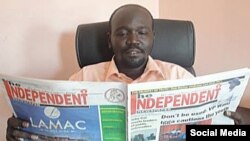The leader of a small opposition party in South Sudan, who was taken from outside his home last week by unidentified men, claimed Friday his captors kept him bound and blindfolded, and beat him repeatedly.
“They closed my eyes, they tied my hands and they took me somewhere very nasty," Peter Mayen Majongdit, the interim head of the recently created People's Liberal Party (PLP), said. Majongdit said his captors released him on Wednesday after holding him for a week in an unknown location.
"For seven days, I was a blind man. I don’t see any world. They just untied my hands to have some food and water, with a gun on my head. They beat me every day – in the morning and afternoon. They said it is lunch and supper and then breakfast. So whenever I eat food, the next thing is to be beaten,” he said.
Majongdit was taken from outside his home on April 1 by unidentified men. Days earlier, he had published a statement in the Juba Monitor newspaper, challenging the government to recover $4 billion that were allegedly stolen by senior politicians. Majongdit said his captors told him he was being held in the presidential palace.
“But there was no president. There was nothing. They were receiving orders on the phone and then they just executed to beat me,” he said.
President's office reacts
Presidential spokesman Ateny Wek Ateny said President Salva Kiir does not order arrests or allow anyone to be detained at the presidential palace. Ateny said Majongdit’s claims that members of President Kiir’s security forces arrested him are false. He said South Sudanese security agencies are bound by a strict mandate and operate within the law. And, Ateny said, when it comes to arrests and detentions, like Majongdit’s, security officials do not take their orders from the president, although he did not specify who gives them their orders.
Ateny said Majongdit should seek legal redress for any suffering he might have endured while in detention. The presidential spokesman also dismissed as baseless allegations that Majongdit was detained because he was critical of Mr. Kiir’s government.
'Conditional' release
Majongdit said he had to agree to certain conditions before he was released. Among them, he said, was an order to limit his political campaign speeches to messages of peace and reconciliation. He said he was also told to stop speaking publicly about the 16-month-old conflict in South Sudan, and to "...stop talking about refunding of the four billion that was stolen."
"They said... many people have tried to talk about [the missing money] before and they have been given a ticket to die," he said.
Majongdit said his captors also asked him why he had opposed extending the terms of President Kiir and other elected officials, including lawmakers, for three years.
Majongdit said he was also instructed not to discuss his detention with journalists, something he said violated South Sudan’s transitional constitution, which guarantees all citizens the right to free speech. Media laws passed last year by the National Assembly and ratified by President Kiir also guarantee the right to free expression.
Majongdit vowed that he will not be silenced because "the next generations will continue to suffer. This is unacceptable."
Majongdit said he was also warned that his party could be banned if he continues to criticize the government. He said he would challenge in the courts any attempt to close down the party.
